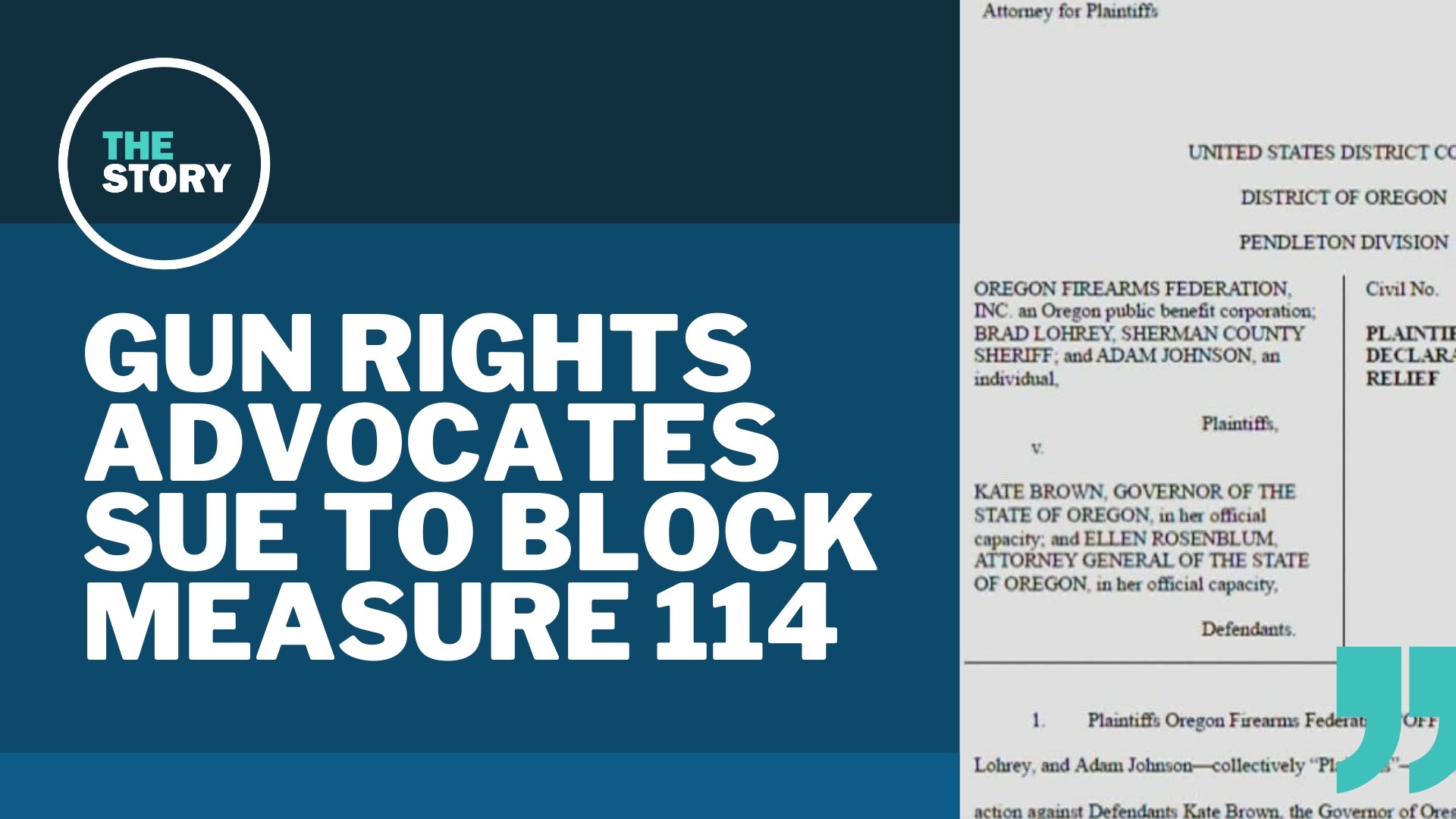PORTLAND, Ore. — As foreshadowed by several Oregon sheriffs after voters narrowly approved gun control initiative Measure 114, the new law is now subject to a lawsuit seeking to put regulations to a halt before they go into place.
On Friday, "no compromise" gun rights group the Oregon Firearms Federation, Sherman County Sheriff Brad Lohrey and the owner of a Marion County gun store filed a lawsuit naming Governor Kate Brown and State Attorney General Ellen Rosenblum. Their attorneys want a judge to block the measure from becoming law.
Not only do the plaintiffs argue that Measure 114 violates the Second Amendment to the U.S. Constitution, they claim that it violates the Oregon Constitution. And if a judge doesn't agree that the measure is unconstitutional in its entirety, the plaintiffs want a pause on the high-capacity magazine ban portion.
Measure 114 bans gun magazines of more than 10 rounds and creates a new permit process to buy a gun, one that involves safety training, background checks and a fee. Due to an unexpected quirk of the process, it also becomes law one month after Election Day — just over two weeks from now.
It's impossible to tell whether a judge will agree to block Measure 114, but some kind of decision is expected before it becomes law on Dec. 8.
The lawsuit takes aim at Measure 114's ban on high-capacity magazines, characterizing magazines that hold more them 10 rounds as "standard issue," and owned by millions of law-abiding Americans.
"Banning magazines over 10 rounds is no more likely to reduce criminal abuse of guns then banning high horsepower engines is likely to reduce criminal abuse of automobiles," the suit says. "The only thing the ban contained in 114 ensures is that a criminal unlawfully carrying a firearm with a magazine over 10 rounds will have a potentially devastating advantage over his law-abiding victim."
A separate challenge against California's ban on high-capacity magazines is already in the court system. A lawsuit now before the 9th Circuit Court of Appeals challenges California's regulations as unconstitutional. This court also has jurisdiction over Oregon, so a decision to strike down California's law would effectively quash this part of Measure 114 in Oregon as well.
The lawsuit against Measure 114 also makes the argument that it violates part of the Oregon Constitution, though this angle has nothing to do with magazine capacity.
Article XI, Section 15 of the Oregon Constitution says, "when the Legislative Assembly or any state agency requires any local government to establish a new program or provide an increased level of service for an existing program, the State of Oregon shall appropriate and allocate to the local government moneys sufficient to pay the ongoing, usual and reasonable costs of performing the mandated service or activity."
The argument is that local sheriff's offices and police departments are now charged with handling the new permitting process for people to buy firearms, including the requirements for safety training. How can they do their regular jobs, the lawsuit argues, and add these new duties without any state funding to hire more people to help?
There are similarities between the Measure 114 permit process and the current process for obtaining a Concealed Handgun License (CHL) in Oregon. It's not a one-to-one comparison — as Lincoln County Sheriff Curtis Landers pointed out, CHL classes to date may not provide all of the same training required by Measure 114. But CHL classes that do meet all of the requirements would qualify as a stand-in for the necessary training to receive a permit, and sheriff's offices in Oregon are already accustomed to accepting and evaluating CHL applications.
Theoretically, however, Measure 114 will result in a much higher volume of people seeking permits for firearms than there were CHL-seekers prior to the new law.
Over the weekend, KGW spoke with Rev. Mark Knutson of Lift Every Voice Oregon, the group responsible for Measure 114. He disputed the lawsuit's claim that the measure infringes on the constitutional rights of Oregonians, especially as concerns high capacity magazines.
"Those who already have them, it already says they would keep them, could use them on their property or at shooting ranges — so nobody's taking away anybody's guns, or their magazines," Knutson said. "So this is about public safety, safe schools, safe communities, and it's been proven to save lives."
When Measure 114 was drafted, Knutson said, the interfaith coalition consulted with gun owners, hunters and law enforcement on the particulars.
Regardless, there is now a race against the clock in Oregon, one between Measure 114's effective date and some sort of preliminary ruling in the case against it. Even if it reaches implementation unimpeded, Measure 114 will still face a full decision on this lawsuit and the federal suit out of California that could gut restrictions on high-capacity magazines.

